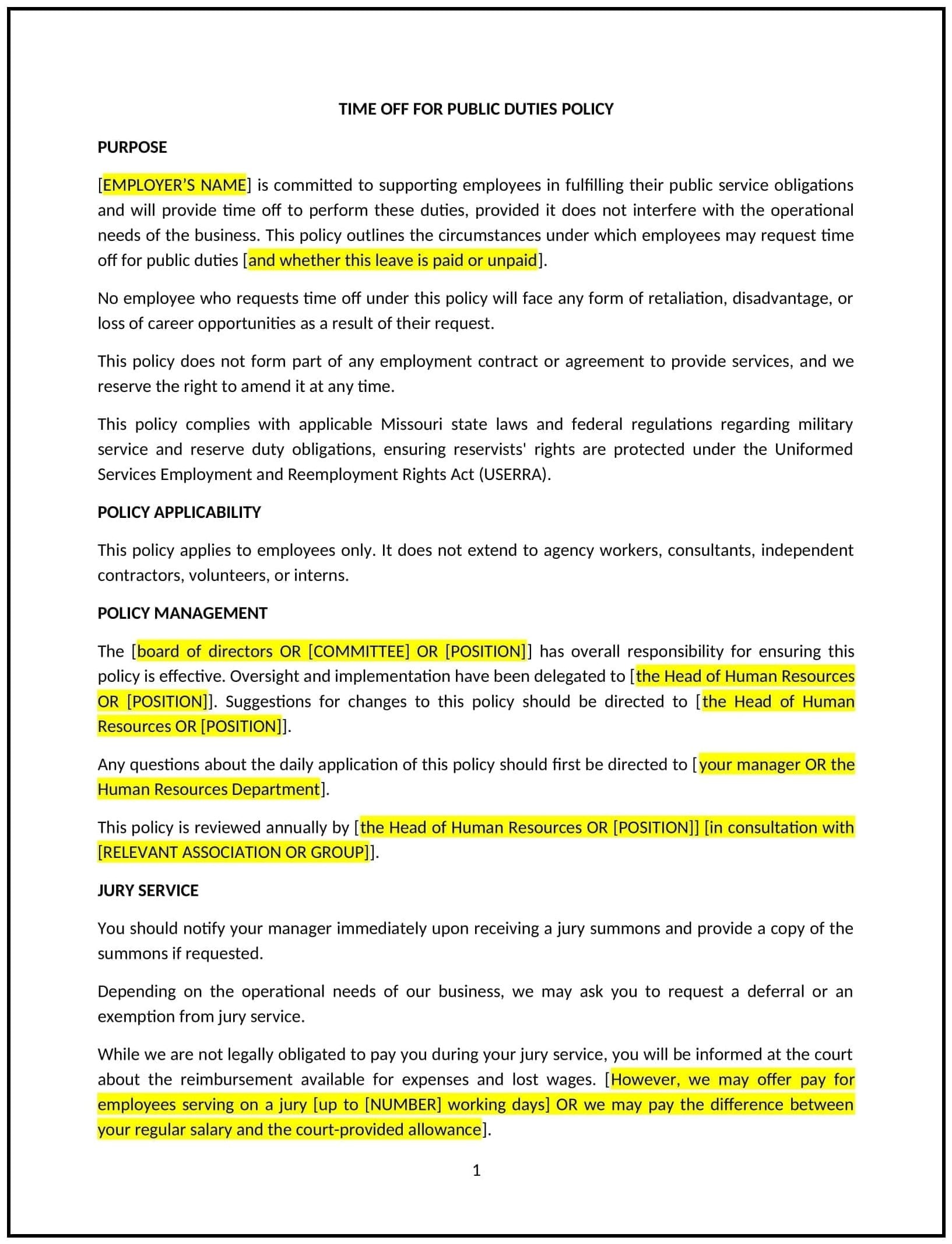Time off for public duties policy (Missouri): Free template
Got contracts to review? While you're here for policies, let Cobrief make contract review effortless—start your free review now.

Customize this template for free
Time off for public duties policy (Missouri)
A time off for public duties policy helps businesses in Missouri support employees who need to take time off for public service responsibilities, such as jury duty, serving as a witness, or fulfilling other civic obligations. This policy outlines the company’s approach to providing time off, the process for requesting time off, and the conditions under which employees are eligible for paid or unpaid leave. It is designed to ensure that employees can fulfill their civic duties without facing negative consequences in the workplace.
By adopting this policy, businesses can demonstrate their commitment to supporting civic engagement and maintain fairness in how time off is granted for public duties.
How to use this time off for public duties policy (Missouri)
- Define public duties: Clearly outline the types of public duties that qualify for time off, such as serving on a jury, participating in a government board or commission, attending court as a witness, or other civic responsibilities as required by Missouri state law.
- Set eligibility criteria: Specify which employees are eligible for time off for public duties, such as full-time employees or those who have been employed for a certain period. Clarify whether part-time or temporary workers are also eligible.
- Determine paid vs. unpaid leave: Specify whether employees will be paid for time off for public duties, or if leave will be unpaid. Some businesses may provide full or partial pay for jury duty or other public service, while others may offer unpaid leave.
- Request process: Define how employees should request time off for public duties, including how much advance notice they must give and what documentation, such as a jury summons or subpoena, is required.
- Address coverage during absence: Outline how employees should plan for coverage during their absence, including whether they need to arrange for temporary help or notify their supervisor in advance of potential work disruptions.
- Set guidelines for extended leave: Specify the company’s approach to longer-term public duties, such as serving on a public commission, and whether the company offers unpaid leave or flexible work arrangements for these circumstances.
- Review regularly: Periodically review and update the policy to ensure it reflects any changes in Missouri state law, federal regulations, or evolving company practices related to time off for public duties.
Benefits of using this time off for public duties policy (Missouri)
This policy provides several benefits for businesses in Missouri:
- Supports civic engagement: By allowing employees to take time off for public duties, businesses demonstrate their commitment to supporting civic participation and community involvement.
- Reduces workplace disruptions: By setting clear expectations for time off for public duties, businesses can plan in advance for employee absences, minimizing the impact on daily operations.
- Enhances employee loyalty: Providing time off for public duties shows employees that their work-life balance and civic responsibilities are valued, improving morale and increasing loyalty to the company.
- Promotes fairness and consistency: A clear policy ensures that all employees are treated fairly when it comes to taking time off for public service, reducing the potential for confusion or perceived favoritism.
- Complies with legal requirements: The policy helps businesses comply with Missouri state laws regarding time off for public duties, reducing the risk of legal challenges or penalties related to leave practices.
- Encourages employee participation: When employees know that they can take time off for public duties without penalty, they are more likely to engage in civic activities, strengthening community ties.
Tips for using this time off for public duties policy (Missouri)
- Communicate the policy clearly: Ensure that all employees are aware of the time off for public duties policy, including how to request time off, what documentation is required, and whether leave is paid or unpaid.
- Provide ample notice: Encourage employees to give as much notice as possible when requesting time off for public duties, so that managers can plan for coverage and minimize disruptions to the business.
- Keep records: Ensure that all time off for public duties is properly documented, including the dates of leave, the type of duty performed, and whether the leave was paid or unpaid, for tracking purposes.
- Be flexible: Consider offering flexible work arrangements or temporary adjustments to work schedules for employees who may have extended public duties, such as serving on a government board.
- Address absences promptly: Be proactive in addressing any potential issues related to employee absences due to public duties, including how work will be managed and whether the employee will need any additional support.
- Review regularly: Periodically review and update the policy to ensure it remains in line with Missouri state laws, business needs, and employee feedback.